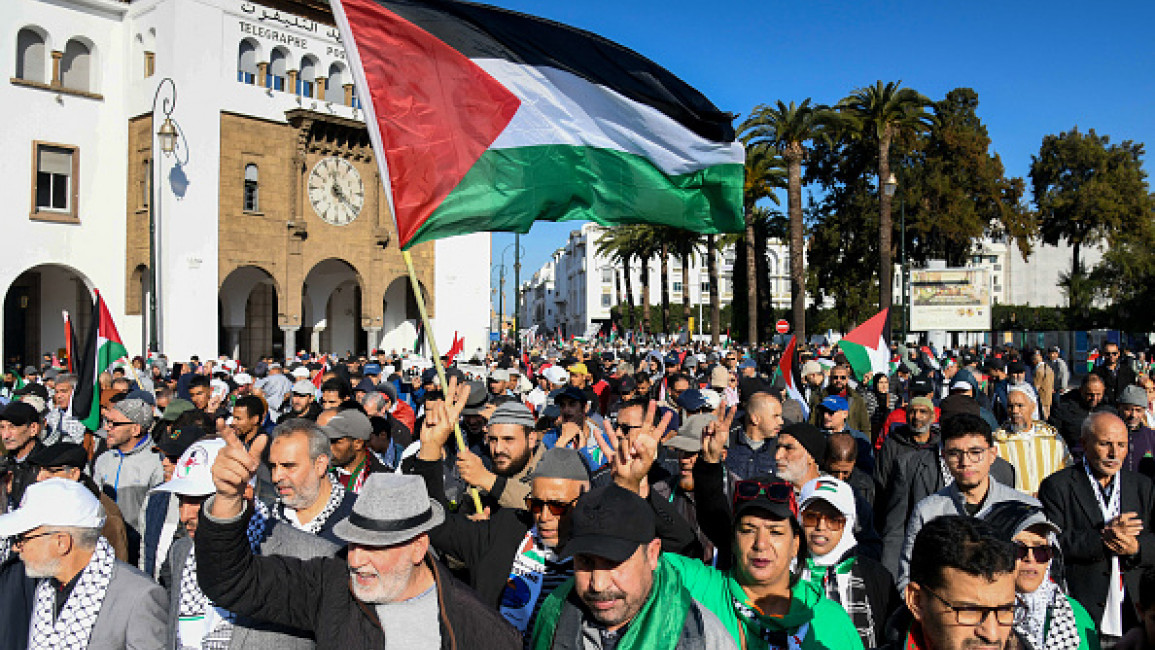Morocco, Israel skip normalisation anniversary celebrations amid Gaza war
On the anniversary of normalisation, Morocco's streets filled with angry crowds while both Rabat and Tel Aviv skipped their usual celebrations.
Over the weekend, a 'million march' swept through Rabat's key square facing the parliament, with people chanting for the end of normalisation with Tel Aviv and an immediate ceasefire in Gaza.
On Sunday morning, 24 December, tens of thousands of protesters started making their way slowly from Bab Lhed to Mohammed V Square, brandishing Palestinian flags and support messages for the Palestinian resistance.
"The march sends, once again, a clear message to those concerned that Moroccans are demanding the Moroccan state to correct a sin committed by the previous government by signing the treaty of shame and disgrace, the normalisation treaty," Jamal Al-Asri, a member of the Moroccan Front Against Normalisation, told The New Arab.
The organising groups said "around a million people" marched in Rabat on Sunday for Palestine.
On Friday, 22 December, Rabat and Tel Aviv were set to celebrate the third anniversary of their normalisation accord.
Over the past years, this anniversary's celebration has taken different shapes based on the diplomatic ties between the two states and the world order.
This year, Tel Aviv and Rabat were finally set to launch full-on celebrations of their partnership after Israel recognised Morocco's sovereignty over Western Sahara - a step Rabat had been pushing for since 2020, which was, reportedly, the sole condition for the North African Kingdom to open a diplomatic office in Tel Aviv.
However, everything turned to chaos after the start of the Gaza war.
Since 15 October, Morocco has started witnessing unprecedented rallies and night protests in a firm call to close the Israeli liaison office in Rabat.
The office is now "temporarily" closed after Israeli officials fled to Tel Aviv in mid-October over "security reasons,' according to the Israeli foreign ministry.
Morocco's ties with Israel go back years before official normalisation. However, Rabat has always maintained a strategy of small steps, matching the movement of the Moroccan street.
After the Oslo Accords, Morocco normalised ties with Israel for the first time "to maintain dialogue and understanding". But Rabat cut off ties with Tel Aviv amid the Second Intifada in 2000.
This time, everything depends on how long the Israeli war on Gaza will last, according to a report by World Politics Review.
"It is unlikely that the current crisis will end the Moroccan-Israeli normalisation process. However, if the war continues for months with a high number of casualties, this will put the Moroccan state in a critical position that may affect normalisation and may even lead to its retreat," it said.
Over eighty days, Israel has killed at least 20,000 Palestinians in Gaza, 70% of whom are women and children. Rabat, meanwhile, has yet to speak up on the status of its ties with Tel Aviv.


![President Pezeshkian has denounced Israel's attacks on Lebanon [Getty]](/sites/default/files/styles/image_684x385/public/2173482924.jpeg?h=a5f2f23a&itok=q3evVtko)



 Follow the Middle East's top stories in English at The New Arab on Google News
Follow the Middle East's top stories in English at The New Arab on Google News


